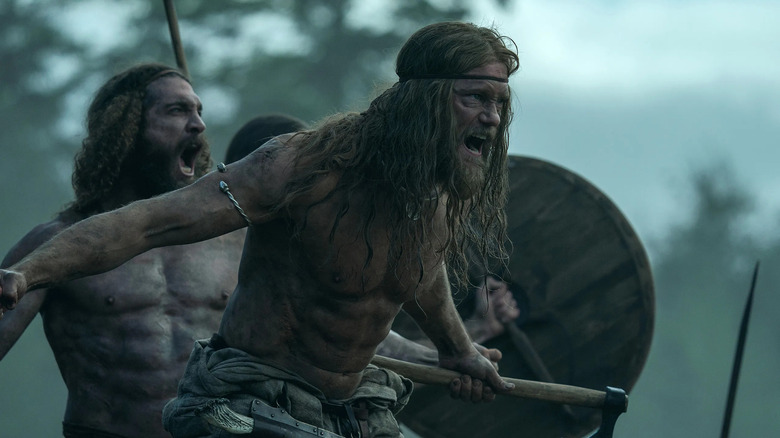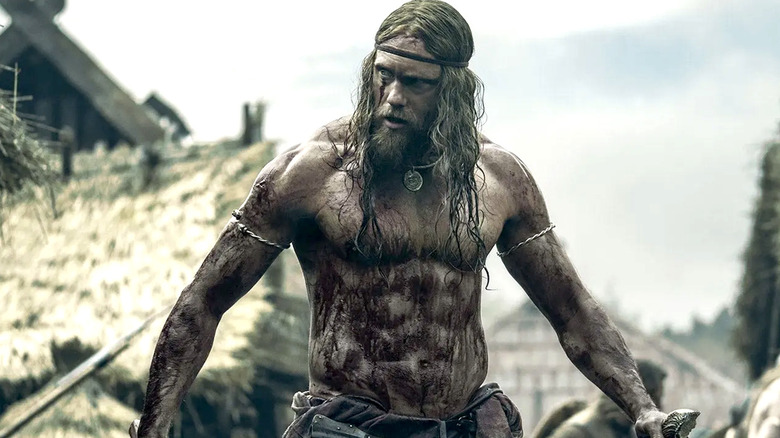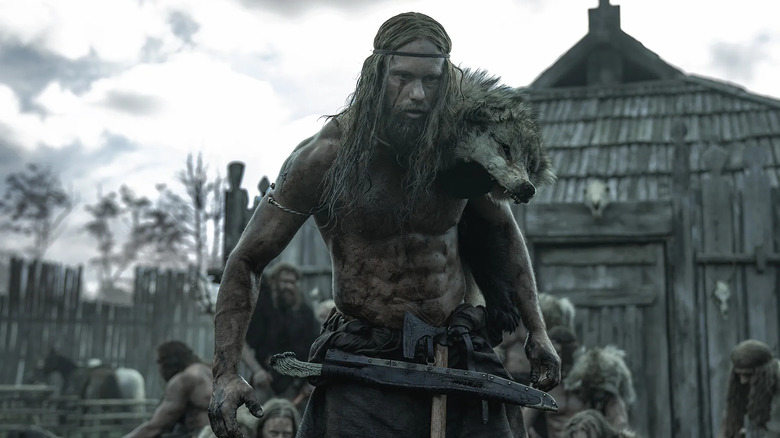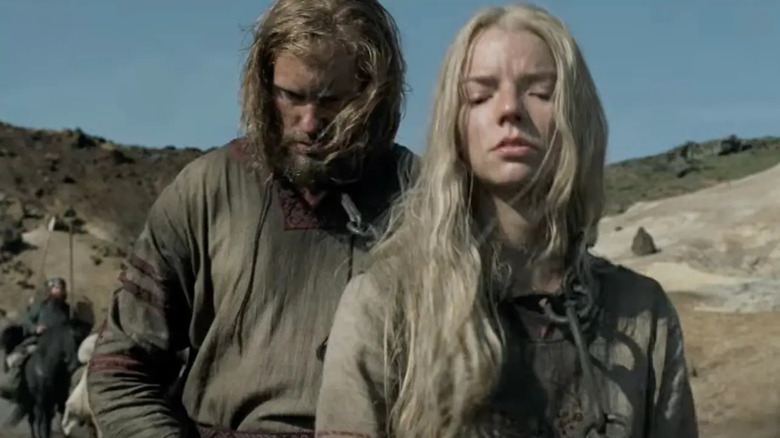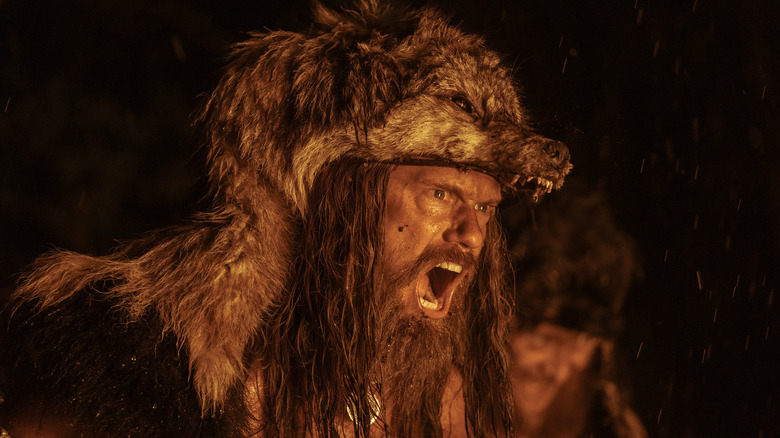The Northman Director Robert Eggers Is Glad To Have An Outlet For His Darkness [Interview]
"The Northman" is a brutal, dark, detailed, and macabre journey into another time and place, an immersive experience that feels less like a movie and more like a guided tour into a long-forgotten hell. In other words, it's a Robert Eggers movie.
After "The Witch" and "The Lighthouse" rightfully put him on the radar of film fans all over the world, Eggers went big with his third movie. It's a viking epic, complete with bloody battles, creepy monsters, A-list movie stars, and a scope that spans nations and decades. It's the kind of movie that will appeal to arthouse movie aficionados, history nuts, and heavy metal-influenced action junkies in equal measure, all while bearing the distinctly unsettling badge of its maker. Yes, Robert Eggers went big, but Robert Eggers still made a Robert Eggers movie.
With "The Northman" now available on home video and digital, I sat down with Eggers over Zoom to talk about the film, including how he crafted that memorable fight in the tomb, what he envies about medieval artists, and the immense planning that went into that grand volcano climax.
Naturally, this conversation contains some spoilers.
'And so that's it. That's it. It's as simple as that.'
What struck me the most about the movie is the mythological aspects. No one is in awe of magic. It happens, and they accept it as a fact of life.
Well, it's part of the fabric of the world of the Viking age. And so that's it. That's it. It's as simple as that.
The whole movie has a horror tinge to it. Really unsettling, upsetting things happen. Can you talk about staying true to the more unforgiving text of legend, and not being afraid to lean into very unsettling material?
I'm very grateful that most people who have been writing about this movie understand my intentions, which is great. Every once in a while, when people are saying it's glorifying violence and masculinity and this kind of thing, it confuses me. But I think that when you try to impose contemporary morals on the past, when you're telling the story, you just lose a lot of ... you lose it. I don't think that you're even really communicating the kind of moral stuff you want to the audience, because you're preaching to the choir, so to speak. And while it's completely possible to make an accurate movie about Vikings and it's completely impossible for me to show something in an unbiased way, I'm trying my very best to articulate the physical material world of the Viking age accurately, and also the Viking mindset without judgment.
And so that is brutal work. You know? So then it's for the audience to come to their own conclusions about this stuff. And if I'm going to do that, it's impossible to be sanitized. But at the same time, I don't show any sexual violence. That's saying something about me, I imagine, and my judgment. Although it is very much implied all over the place. But I also think you don't need to like see it to understand its existence.
That's why I think the movie works so well, is that it doesn't talk down to the audience. It says, "Hey, we're going to see a portrait of this world. We're not going to ask you to make judgments on it." I'm assuming that was an uphill battle creatively?
I think this is more powerful, or anyway, potentially, but I think we ... there's a redheaded kid in the Slavic village whose mother is being apprehended by Vikings. And he runs away and he gets caught and then put in the bar [on the door] and then they set fire to [the building]. But the studio was very concerned about this beat. And my solution was simply just like, we don't see the kid actually being put in the barn. Maybe it's better like that.
'I think it's hard to do this kind of creative work in a modern secular society because it becomes all about your ego and yourself.'
Between "The Lighthouse" and "The Witch" and this, you're clearly drawn to the dark, the creepy, the old, the unsettling. What about ancient legends and stories and folk tales appeals to you? What gets under your skin?
Well, I mean, you touched on two things sort of, which is just like why the dark stuff, the macabre? And that, I just do not know. But thankfully, I'm lucky that I have an outlet for my darkness, so I can be a happy dad, taking my kid to the playground and taking out the trash, otherwise.
This sounds super uber-precious, but I think it's hard to do this kind of creative work in a modern secular society because it becomes all about your ego and yourself. And I am envious — this is the horrible part — I'm envious of medieval craftsmen who are doing the work for God. And that becomes a way to ... you get to be creative to celebrate something else. And also, you're censoring yourself because it's not about like me, me, me, me, me, me. So you say, "Oh, I got to rein that back because that's not what this altar piece needs to be." Any worldview where everything around them is full of meaning is exciting to me, because we live in such a tiresome, lame, commercial culture now.
Speaking of tiresome, lame, and commercial, I don't know how online you are, but, "Avenge father, save mother, kill Fjölnir," became very much a meme on social media. People started really quoting it, like adding it to the grocery list as jokes. I'm curious if you have a reaction to that.
Anything's good with me.
The moment I keep thinking about is the fight in the tomb with the skeleton guardian. Can you talk about the genesis of that scene?
It's just a really common trope in sagas where the saga hero or antihero needs to get their magic sword from a burial mound. And there's an undead Viking that's guarding the sword and they have to chop off his head and stick its head between its butt cheeks. It's just in a lot of sagas and we thought it should be in this one, too.
A lot of people, myself included, have watched that scene and thought, "Man, does Robert Eggers play video games?" There's definitely a video game structure to the quest in the movie.
No, it's just from the research material, but I think there's a podcast I listened to called "Saga Thing" and they had somebody talking about the way that sagas have influenced fantasy fiction, which has influenced video games. And so I think that some of that structure comes from these generations of influences.
'I definitely do need to do one more New England folktale'
I'd like to ask about some of your recurring actors, like Willem Dafoe and Ralph Ineson. Do you feel like you're building your stable of actors in the way that Martin Scorsese or Wes Anderson have certain people who always show up?
I mean, I hope so. And I love repeat collaborations because you already trust each other and you already know each other. And that can sometimes be the biggest obstacle.
Those two in particular, I'm excited to see them pop up more your work, because they seem like they're willing to jump into whatever crazy idea you throw at them.
I feel like both of them, very kindly, took small roles in this film, so I'm very appreciative. And hopefully the next one, they've got something a little more to chew on.
Is there a next one right now? I know there's been conflicting reports about what's up with "Nosferatu," which I'm really hoping is still happening.
I really hope it's still happening too.
So no word on if you guys are getting moving forward with it?
I always have to have more than one pot on the stove to survive in this industry.
Is there another setting or time period that you're excited about, one that you'd love to explore?
Well, I mean, I definitely do need to do one more New England folktale. I think that needs to be some kind of a trilogy. So at some point, I'm going to have to do one more of those.
I feel like you got to have your Lovecraft, your Arthur Machen, or your Algernon Blackwood. Right?
That would also be great. Yeah, I'd love to do a nice Edwardian, British folk horror. That would be enjoyable.
'How do we have Amleth losing while still keeping it cool?'
I'd love to hear about the ending of the movie, the volcano fight. I know you've done number of interviews about it and I know most of the headlines are focused on digital genitalia. So I wanted to focus on the actual fight itself, the staging of it. How did you go about conceiving and creating that sequence?
The very final moment was something that was in the script.The raid and the Knattleikr sequence and the fight with the undead viking, those were all written beat for beat, pretty close to what's in the script.
The undead Viking sequence, that did develop actually quite a bit during the fight choreography. But this volcano scene was the closest to kind of like, "they fight," closest to that. And so it did take a lot of figuring out. And mainly, just how do we have Amleth losing while still keeping it cool? And it was also an opportunity to — because this is the first time we're seeing two really elite Vikings fight each other — where we get to use a little bit of more of what some historians think Viking fighting styles were like, and got to use the shields in some interesting ways, which was enjoyable.
It was a lot of rehearsals and kind of figuring it out. But as far as the effects versus practical stuff, I mean, we built a set in a quarry. Production designer Craig Lathrop brought a ton of black earth to make it look more like Mount Hekla, which we scouted in person and also photographed for elsewhere in the film, brought in some more rocks and stuff. And then the majority of the flames, maybe almost all the flames are real. And the majority of the smoke and ash is real. We had some real cinders, but I think that the cinders lean more CG. And then with the lava, Jarin Blaschke, my DP, and Seamus Lynch, the gaffer, created these LED lights that they embedded into the landscape in the shape of the lava flows. And they were programmed for the light to move the way lava moves so that it interacts with the actors in a more realistic way.
And then Angela Barson, the VFX supervisor went to Iceland to where the recent eruption was, to take reference footage so that it looks quite believable. So then all that stuff gets tied together and CG genitals and everything else.
Based on the level of detail on your films, and the props, and costumes, have you ever been compelled to keep something? I feel like I'd be stealing things from your own sets all the time.
Well, I think that can be sort of the problem is that you want everything. I would happily live in the keeper's cottage from "The Lighthouse" or a slightly modernized version of the farmhouse from "The Witch." I actually don't have too many things. I have a mermaid, obviously, from "The Lighthouse" and I do have the sword, Alex's sword that he gets from the mound dweller. But in fact, that's in storage at the moment.
"The Northman" is now available on streaming and VOD.
